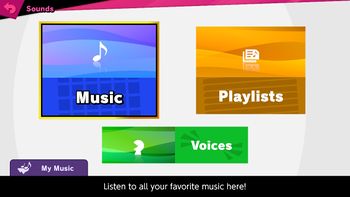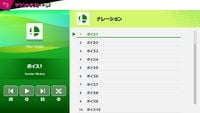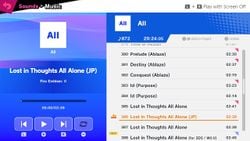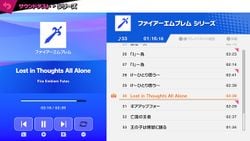Sound Test

Sound Test is an option that appears in the Super Smash Bros. games.
Overview
The Sound Test allows the player to listen to most of the music and sounds in the game. Players can listen to the voices of characters, stage music, and listen to other variety of sounds. In Super Smash Bros. and Melee, the Sound Test can be accessed through Data Mode; in Brawl, it can be accessed through either Data or Option Mode; in SSB4 it is located in the Vault and can also be accessed via the sound settings in Options. If the player leaves the Sound Test while a song is playing and goes back through the menus, the song will still play until it is overridden by another piece of music, or until the player enters the character select screen.
In each game, the methods of accessing the Sound Test differ:
- In Super Smash Bros., one can unlock the Sound Test by completing Break the Targets and Board the Platforms with all 12 characters.
- In Super Smash Bros. Melee, the Sound Test is unlocked by unlocking all playable stages.
- In Super Smash Bros. Brawl, the Sound Test is available without unlocking, though songs and sounds remain hidden until their source character, stage, or CD is unlocked.
- In Super Smash Bros. 4, the Sound Test is available by default. Some music tracks must be unlocked through challenges, as well as through collecting CDs on the Wii U version, or downloading associated DLC.
- In Super Smash Bros. Ultimate, the Sound Test is the same as in the previous game, with tracks needed to be unlocked through challenges, buying them from the Shop, or downloading associated DLC.
Some pieces of music are unavailable in the Sound Test for unknown reasons; this includes the Fighter Select music in SSB, the Giga Bowser music in Melee, and the Cruel Brawl theme along with the winter version of Obstacle Course in Brawl. SSB4's Sound Test is missing some character voice clips, such as those of Duck Hunt. In Ultimate, Duck Hunt's noises are present, but those of Samus and Mr. Game & Watch are still missing.
In SSB, music and sounds do not have specific categories; from Melee onwards, they are organized by series for music, and by fighter for sounds. Generic, menu, and stage sounds each have a singular category, as do enemies, Poké Ball Pokémon, and Assist Trophies. Transforming characters like Sheik in Melee and Brawl, helper characters like Pikmin, and summonable characters from some Final Smashes and results screens (such as the Phantom Thieves of Hearts) are grouped under the main character's section (in aforementioned cases, being Zelda, Olimar and Joker respectively). Conversely, alternate costumes serving as alternate "characters" in SSB4 and Ultimate (such as the Koopalings or female Robin) feature separate sections from the default ones. In each game, Kirby's copy ability voice clips are unlocked after unlocking every base game fighter.
Starting in SSB4, unlike previous games, only music and voices are available; sound effects and victory themes are not. Additionally, unlike previous Smash titles, songs in Sound Test cannot be played indefinitely, instead fading out. The player can create a playlist by marking songs as favorites and can choose to have songs play in order or at random or to repeat a selected song once it is finished. Music tracks are indicated by a blue background, while voice clips are in green.
In Super Smash Bros. for Nintendo 3DS and Ultimate, the Sounds section can be set to play music even when the console is in sleep mode, with the L and R buttons used to skip between tracks. The sleep mode functionality can only be used if headphones are inserted.

The Japanese versions of SSB4 and Ultimate include credits for the voice actors of each character in the voice section. Notably, Kazumi Totaka and Masahiro Sakurai—the voice actors for Yoshi and King Dedede respectively—are credited here, but not in the actual credits. This is not consistent, however: the Inklings' voice actor, Yuki Tsujii, is not credited in the Sound Test or the credits. This is not present in any other version of the game, likely due to the use of uncredited union voice actors in the series' English dubs.
Another peculiarity specific to Ultimate is that, in the Japanese version, songs from English games use the localized English title rather than the original Japanese one. For example, the source game of the English version of Ashley's Song is listed as WarioWare: Touched!, rather than さわる メイド イン ワリオ. The same principle applies in reverse; in the English version of the game, the source game of Lost in Thoughts All Alone (JP) is listed as Fire Emblem: if instead of Fire Emblem Fates.
Unused sounds
There are occasions where the Sound Test has sound clips that were never used in-game:
- In Super Smash Bros., voice clips of the announcer saying "Bonus Stage", "Draw Game", "Are you ready?" and "Final Stage" go unused; in the Japanese version, there is also an unused announcer clip for "Jigglypuff" (rather than "Purin", its Japanese name).
- In Melee, there are voice clips of the announcer saying "Master Hand", "Giga Bowser/Giga Koopa", and "Fighting Wire Frames"; these were most likely meant for Classic Mode or a similar purpose. Other unused voice clips include "(Character) wins", as in the previous game, and "How to Play". Finally, a clip of the announcer saying "and" goes unused, but later appeared beginning with Brawl's Classic Mode.
- Crazy Hand's sounds are located within the Master Hand section, all except the sound heard when the player KOs him.
- Furthermore, playable characters have other unused sounds; Pichu and Pikachu, for instance, have unused sounds where they yell "PI-CHU!" and "PI-KA!" respectively, Marth has one where he says "let's dance" in English (which is only accessible through the debug sound test), and Ganondorf has a "Hoo-yah!" yell that is also unused. The latter would eventually be used for Brawl, despite Ganondorf otherwise having a different voice actor.
- Crazy Hand's sounds are located within the Master Hand section, all except the sound heard when the player KOs him.
- In Brawl, most characters also have voice clips in the Sound Test that are unused during normal gameplay. Some of them are also taken from previous Smash Bros. games: Ness, for example, has one of his high-damage yells from Melee, Fox has one of his high-damage yells untranslated for unknown reasons, Kirby has a "Hi!" that resembles more that of the previous games, and Captain Falcon has his voice from when he picks up a heavy item in Smash 64. Most of them (notably the damage yells) would later be recycled in SSB4.
- Voice clips of the announcer saying "Stage Clear" and "Fighting Alloy Team" also go unused, as well as additional final countdown timer clips starting from "ten".
- Likewise, in SSB4, Corrin also has unused damage yells. They would later be recycled in Ultimate.
- In Super Smash Bros. for Nintendo 3DS, some unused announcer voice clips correspond to features from Super Smash Bros. for Wii U, such as "Grab the Coins" and "Special Smash".
Not in Sound Test
- In Super Smash Bros., the announcer voice clips "Defeated", "Race to the Finish/Hurry to the Battle Stage", "Wins/Win", "Congratulations", and "Incredible" are not in the Sound Test; they are only accessible through the debug menu.
- Sound Test file 50 under "Announcer" in Super Smash Bros. Melee has the announcer saying "Giga Koopa" or "Giga Bowser" depending on the game's language, an otherwise unused sound clip. Interestingly, this causes a language error, as the announcer says "Giga Koopa" (Bowser's Japanese name) in the English version of Melee, while the announcer says "Giga Bowser" in the Japanese version. The PAL release only includes the latter sound clip, where the announcer correctly says "Giga Bowser", due to the release not having a Japanese language option. Furthermore, if Giga Bowser is loaded in the debug menu's result screen test, the correct voice clip is used.
- Crazy Hand's laugh voice clip is not present in Brawl's Sound Test, while his defeat voice clip is.
- The "Multi-Man Smash" voice clip is not present in the for Wii U Sound Test, despite being present in for 3DS.
- The announcer's "The champion is..." voice clip is additionally not present in for Wii U. This is not the case in both Brawl and Ultimate.
- In SSB4, every character is missing their swimming voice clip. This is possibly due to characters not being able to swim in the 3DS version.
- In SSB4 and Ultimate, some characters additionally have one or more voice clip that are missing in the Sound Test; for example, Dark Pit's section in Smash 4 lacks the "It's time!" voice clip when he performs Dark Pit Staff, while Zero Suit Samus' section in Ultimate lack all of her taunt voice clips. Additionally, in Ultimate, prior to version 8.0.0, many fighters were missing character-specific victory quotes.
- For unknown reasons, Dr. Mario does not have his own section in the sound test in SSB4. While he shares a majority of his voice clips with Mario in all of his appearances, he still has a section in his other appearances.
Gallery
The Sound Test as it appears in Super Smash Bros.
The Sound Test as it appears in Super Smash Bros. Melee.
The Sound Test as it appears in Super Smash Bros. Brawl.
The Sound Test as it appears in Super Smash Bros. for Nintendo 3DS.
The Sound Test as it appears in Super Smash Bros. for Wii U.
A glitch in Wii U showing the source of Menu as Mario Kart 8.
The Japanese Sound Test in Wii U gives credit to voice actors; in this case, Satomi Satō for Corrin.
The music section in Super Smash Bros. Ultimate.
The voice section in Ultimate with multiple characters in one section; in this case, the Ice Climbers, counting Popo and Nana separately.
Trivia


- In Melee, some clone characters have sounds in their sound test sections that are used only by their base counterparts. For example, Luigi and Dr. Mario's sound test sections include the Mario power-up/power-down sound effects heard when Mario performs his taunt, and Ganondorf's sound test section includes the bird shriek heard when Captain Falcon performs the Falcon Punch. In turn, the sound effect of the Warlock Punch is heard only in the Universal Sounds section.
- In Melee, the last song that the player listened to (with the exception of songs that don't loop, such as "Opening" and "Ending") will play in the Trophy Gallery.
- R.O.B.'s portrait in Super Smash Bros. for Nintendo 3DS's sound test uses his Famicom colors; this makes sense in the Japanese version, as it is his default color scheme, but creates a discrepancy in the international versions of the game, which use R.O.B.'s NES colors as his default.
- In Super Smash Bros. for Wii U, a glitch can occasionally cause the sound test credits to become misaligned with the song currently playing.
- In SSB4, when a music track or fighter voice clip is selected or hovered over, a character silhouette from that song's respective universe, or in voice clips' case, their source character, appears to match the song/voice, with the exception of the Dr. Mario tracks (which only displays a Dr. Mario silhouette), Mt. Dedede (which only shows King Dedede), and Tomorrow's Passion (which only shows Little Mac).
- In the 3DS version, if a Golden Hammer is used to skip a challenge that rewards a stage for unlocking its corresponding character, a question mark will appear for its music instead of a silhouette (unless other characters from the same series are already unlocked).
- In SSB4 and Ultimate, while most other characters with selectable genders have "(Male)" or "(Female)" attached to their names, Inkling uniquely uses "(Girl)" and "(Boy)", reflecting the terminology in the Splatoon series. This distinction is also present in the spirit list. Byleth's name tags initially did not distinguish the gender at all other than portraits; this is likely because it is spelled differently in Japanese depending on gender. A subsequent update gave them the gender tags in western languages.
- The Mii Fighter voice clips in Ultimate are separated into male and female sections, with Mii Swordfighter being the icon for the male voice clips and Mii Gunner being the icon for the female voice clips.
- In Ultimate, characters with two selectable genders (Pokémon Trainer, Villager, Inkling, Wii Fit Trainer and the Mii Fighters) have two identical announcer calls in the Sound Test. This is likely a placeholder for languages with gendered nouns, which use separate voice clips (for example, Villager in Spanish is "Aldeano" for male and "Aldeana" for female).
- Bayonetta has two nearly identical sections of voice clips in Ultimate's Sound Test, due to her original Bayonetta costume using English voice clips in all regions. The only difference between the two is a singular voice clip, wherein Bayonetta says "Boom!", something otherwise shared in both costumes.
- In Ultimate, Larry has 27 voice clips, unlike Bowser Jr. and the other Koopalings, who all have 28.
- Oddly, the sorting of series in Ultimate's Sound Test is different from the Spirits list and the official website. Normally, EarthBound is listed first and F-Zero is listed afterward, and the third-party series are listed in order of their Smash debut; in the Sound Test, EarthBound comes after F-Zero, and the third-parties are grouped together between the Splatoon and Other categories.
See also
| Super Smash Bros. menu items | |
|---|---|
| VS Mode | VS Start (Team Battle) · Rule · Time / Stock · VS Options |
| 1P Mode | 1P Game · Training Mode · Bonus 1 Practice · Bonus 2 Practice |
| Option | Sound · Screen Adjust · Backup Clear |
| Data | Characters · VS Record · Sound Test |
| Unused | Debug menu |
| Super Smash Bros. Melee menu items | |
|---|---|
| Vs. Mode | Melee (Time · Stock · Coin Battle · Bonus · Team Battle) · Custom Rules · Special Melee · Tournament Mode · Names |
| 1-P Mode | Regular Match (Classic Mode · All-Star Mode · Adventure Mode) · Event Match · Stadium (Target Test · Home-Run Contest · Multi-Man Melee) · Training |
| Trophies | Gallery · Collection · Lottery |
| Options | Rumble · Sound · Screen Display · Language · Erase Data |
| Data | Snapshots · Melee Records · Sound Test · Archives (NTSC only) · How to Play (PAL only) |
| Unused | Debug menu · Debug sound test menu |
| Super Smash Bros. Brawl menu items | |
|---|---|
| Group | Brawl (Time · Stock · Coin Battle · Team Battle) · Rules · Special Brawl · Rotation · Tourney · Names |
| Solo | Classic · All-Star · Adventure Mode: The Subspace Emissary · Events · Stadium (Target Smash!! · Home-Run Contest · Multi-Man Brawl · Boss Battles) · Training |
| Wi-Fi | Spectator Mode · With Anyone · With Friends |
| Vault | Trophies & Stickers (Trophy Gallery · Trophy Hoard · Coin Launcher · Sticker Album · Sticker Center) · Stage Builder · Album · Challenges · Replays · Masterpieces · Chronicle |
| Options | Screen · Deflicker · Rumble · Controls · Sound · My Music · Erase Data |
| Data | Movies · Records (Group Records · Brawl Records · Notices) · Sound Test |
| Super Smash Bros. for Nintendo 3DS menu items | |
|---|---|
| Smash | Smash (Solo · Group · Time · Stock · Team Battle) · Rules |
| Smash Run | Solo · Group · Custom · Select Music |
| Games & More | Classic · All-Star · Stadium (Multi-Man Smash · Target Blast · Home-Run Contest) · Training · Custom · amiibo · Vault (Trophies · Trophy Rush · Album · Replays · Sounds · Records · Tips) · Options (Controls · Sound · Character Outline · Damage Display · Internet Options) |
| Online | Spectator Mode · With Anyone (For Fun · For Glory) · With Friends · Conquest · Share |
| Other | Challenge · StreetPass · Wii U |
| Super Smash Bros. for Wii U menu items | |
|---|---|
| Smash | Smash (Time · Stock · Coin Battle · Team Battle) · 8-Player Smash · Special Smash · Rules · Controls |
| Games & More | Classic · All-Star · Stadium (Target Blast · Home-Run Contest · Multi-Man Smash) · Training · Events · Special Orders (Master Orders · Crazy Orders) · Custom · Stage Builder · amiibo · Vault (Trophies · Trophy Rush · Album · Replays · Movies · Sounds · Records · Tips · Masterpieces) · Options (Controls · Sound · My Music · Internet Options) |
| Online | Spectator Mode · With Anyone (For Fun · For Glory) · With Friends · Online Events (Tourney · Conquest) · Share |
| Other | Challenge · Smash Tour · 3DS |










